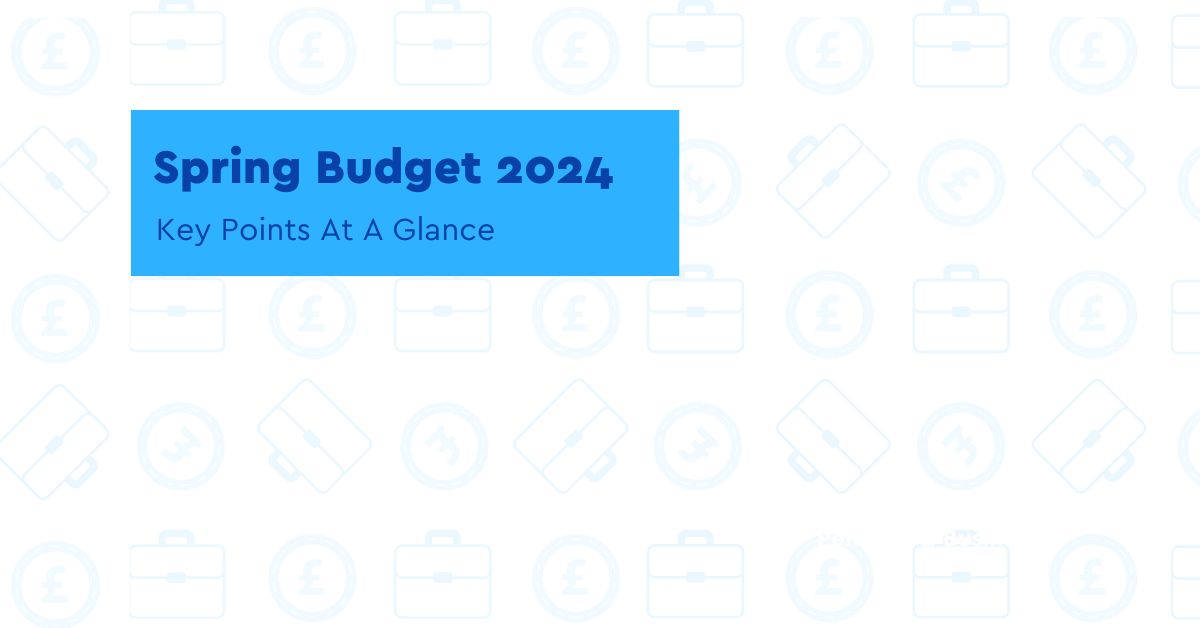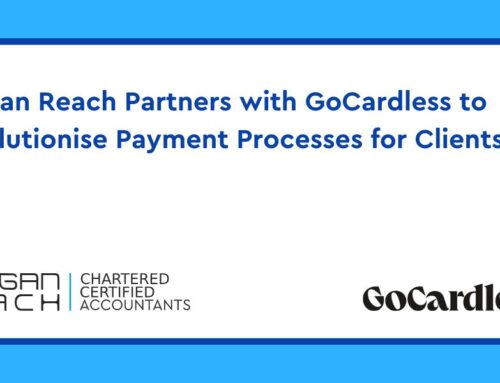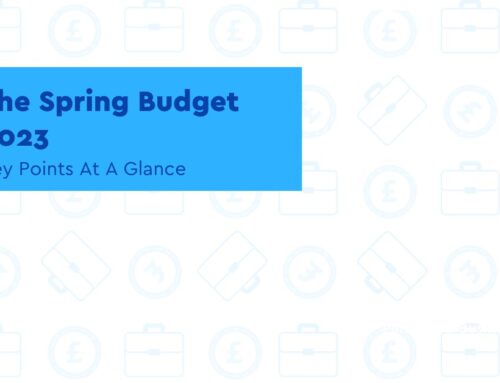The Spring Budget 2024
Introduction
With the next General Election fast approaching, the Chancellor of the Exchequer, Jeremy Hunt came to Parliament to deliver his Spring Budget.
Stated below are some of the main announcements which have come out of this Budget as well as a reminder of ones from prior Budgets/ Statements which may have an impact upon the 2024/25 tax year.
Income Tax Allowance + National Insurance + Rate Bands
Please be aware that the Scottish Parliament has had the power for a number of years to vary the tax rates and thresholds of Non-Savings, Non-Dividend income for Scottish taxpayers. The differential between Scotland and the rest of the UK in this respect has grown quite significantly as demonstrated by the chart below. This makes things even more complicated for Scottish taxpayers when looking at carrying out any legitimate form of tax planning.
Like Scotland, the National Assembly of Wales can vary the tax rates in respect of Welsh resident taxpayers as regards Non-Savings and Non-Dividend income. However, to date they have continued to set income tax rates in line with that announced by the UK Government.
The Income Tax Personal Allowance and all other elements of the Income Tax system remain part of the Chancellor’s responsibility.
As was previously announced in the 2022 Autumn Statement, the Personal Tax Allowance currently set at £12,570, will remain at this level until 2028. The Basic Rate Tax Band, presently set at £37,700 will also stay the same until April 2028. Personal allowances will be reduced by £1 for every £2 a person’s income exceeds £100,000.
UK Tax Rates 2024/25 (except Scotland)
| Band | Rate |
| £0 to £12,570 | 0% |
| £12,571 to £50,270 | 20% |
| £50,271 to £125,140 | 40% |
| Over £125,140 | 45% |
Scottish tax rates 2024/25 re non-savings, non-dividend income
| Bands | Band Name | Rate |
| £0 to £12,570 | Personal allowance | 0% |
| £12,571 to £14,876 | Starter rate | 19% |
| £14,877 to £26,561 | Scottish basic rate | 20% |
| £26,562 to £43,662 | Intermediate rate | 21% |
| £43,663 to £75,000 | Advanced rate | 42% |
| £75,001 to £125,140 | Higher rate | 45% |
| Over £125,140 | Top rate | 48% |
- As announced in the Autumn Statement 2023, from 6 April 2024, self-employed people with profits above £12,570 will no longer be required to pay Class 2 NICs, but will continue to receive access to contributory benefits, including the State Pension.
- The employees NIC rate will be reduced from 10% down to 8% from April 2024.
- The self-employed Class 4 NIC rate will fall from 8% to 6% from April 2024.
2024/25 National Insurance rates
| National insurance (NI) | 2024/25 |
| Class 1 NI employees – earnings between £12,570 – £50,270 | 8% |
| Class 1 NI employees – earnings in excess of £50,270 | 2% |
| Class 1 NI employers – earnings in excess of £9,100 | 13.8% |
| Class 1A Benefits in kind | 13.8% |
| Class 1B NI PAYE settlement agreements | 13.8% |
| Class 4 NI self-employed – Profits between £12,570 – £50,270 | 6% |
| Class 4 NI self-employed earnings in excess of £50,270 | 2% |
| Mandatory Class 2 NI | Abolished |
| Class 2 voluntary NI | £3.45 per week |
| Class 3 voluntary NI* | £17.45 per week |
*2022/23 Class 3 NI weekly contributions can be paid up to 5th April 2025 to cover missing state pension years back to 2006.
| Quick tip
With the cut in national insurance rates from April 2024, consider whether it is advantageous delaying paying a bonus until after 5th April 2024. However, if you are a Scottish resident taxpayer, despite the national insurance cut, you may want consider, if going down the bonus route, paying it prior to 6th April 2024 as the Scottish income tax rates and rate bands as regards earned income are changing from that date.
|
| Quick tip
If you have more than one employment you may pay too much employees’ national insurance. HM Revenue & Customs can request the second employer to operate a lower rate to ensure the correct amount is paid. Refunds may be possible if national insurance has been overpaid in earlier years.
|
| Quick tip
If you are a sole trader or property landlord and your turnover (pre expenses) exceeds £50,000 during the 2024/25 tax year you may need to be Making Tax Digital for Income Tax (MTD) compliant from April 2026 which will require quarterly reporting. If you are both a sole trader and a property landlord then you aggregate the two turnovers together when applying the £50,000 threshold. Are you ready for this? If not we can help. Options to consider to avoid having to be MTD compliant might be creating a partnership or incorporating the business.
|
| Quick tip
If you are self-employed and your taxable profits are below £6,725 for the year, you may want to consider paying voluntary Class 2 NI as opposed to voluntary Class 3 NI as it will be considerably cheaper and will enable you to continue to have access to contributory benefits, including the state pension.
|
| Quick tip
If you are self-employed and your accounts year does not end between 31st March – 5th April. Up to and including 2022/23 tax year you will have been taxed on the profits per the accounts which ended in that particular tax year. From the 2023/ 2024 tax year (the transitional year) onwards you will be taxed on the profits per the tax year itself. Is it worthwhile changing your accounts year to tie in with the tax year? Is it worth considering incorporating so that you can continue to be taxed on the profits per the accounting period rather than on a tax year basis. If you do not intend to move your accounting year to coincide with the tax year end, the excess profit that arises under the new rules in the transitional 2023/24 tax year can be spread and taxed over 5 tax years. However it may be worth considering electing to bring forward some or all of those excess profits to be taxed in an earlier tax year. For example your total income in later years may take you into a higher tax bracket or the Government of the day may increase the tax rates.
|
| Quick tips
Are you going to receive shares from your employer as a result of your employment? Subject to the way those shares are provided, you could be liable to an immediate income tax charge (in some cases national insurance as well), based upon the actual market value (AMV) of the shares at the time. You and your employer may want to elect, within 14 days of receiving the shares, to be taxed on the unrestricted market value (UMV) instead. More tax is likely to be paid upfront but it may result in considerable overall tax savings further down the line.
|
Dividends
- As already announced, the zero rate tax dividend threshold will fall from £1,000 to £500 from 6th April 2024.
- There will be no change to the dividend tax rate.
| Band | 2023/24 | 2024/25 |
| Dividend ordinary rate | 8.75% | 8.75% |
| Dividend upper rate | 33.75% | 33.75% |
| Dividend additional rate | 39.35% | 39.35% |
| Quick tip
If you are a director/shareholder resident is Scotland, as the tax rates on Non-Savings and Non Dividend income is noticeably higher than in the rest of the UK you may find it tax efficient to pay out more in dividend than in salary.
|
| Quick tip
With the dividend zero rate threshold falling from £1,000 (2023/24) to £500 (2024/25), is it worthwhile transferring some shares to a spouse/civil partner to maximise it. Do you have control over when a dividend can be paid out? If so have you made use of the £1,000 zero rate threshold for this tax year?
|
Furnished Holiday Letting (FHL)
- The FHL tax regime will be abolished, eliminating the tax advantage for landlords who let out short-term furnished holiday properties over those who let out residential properties to longer-term tenants. This will take effect from April 2025.
- Draft legislation will be published in due course and will include an anti-forestalling rule.
- This will prevent the obtaining of a tax advantage through the use of unconditional contracts to obtain capital gains relief under the current FHL This rule will apply from 6 March 2024.
| Quick tip
Depending upon what is in the legislation, this could result in a large increase in your overall tax liability. It would make sense, at some point pre April 2025, to carry out a rental property review to look at legitimate ways to either mitigate the tax bill or increase the net rental yield. |
Capital Gains Tax (CGT)
- Currently gains made on disposals of residential property that do not qualify for main residence relief (MRR) are chargeable to CGTat 18% for any gains that fall within an individual’s unused basic rate band and 28% where the chargeable gains exceed the unused part of their basic rate band
- From 6th April 2024, the higher capital gains tax rate on the sale of residential property will be reduced to 24% from 28%.
- This change may impact upon individuals, trustees and personal representatives who are liable to pay Capital Gains Tax (CGT) on residential property gains.
- The lower rate for basic rate taxpayers will remain at 18%.
- A reminder that the CGT annual exemption (AE) for individuals, personal representatives (PR) and Trustees is set to fall next tax year.
UK CGT Annual Exemption
| Tax Year | Individuals/PR * | Trustees** |
| 2023/24 | £6,000 | £3,000 |
| 2024/25 | £3,000 | £1,500 |
*Note – the AE is only available to PRs for 2 tax years following the tax year in which the Deceased died.
** Note – the AE is divided equally between the number of Trusts set up by the Settlor (the AE is presently capped at £300 per Trust if 5 or more, or 10 or more if for the benefit of a disabled person),
UK CGT Rates
| Status | Residential property | Other Asset |
| Individual | 18%/24% | 10%/20% |
| Personal Representatives | 24% | 20% |
| Certain Trusts | 24% | 10%/20%* |
*If the Trust asset disposed of has been used in the beneficiary’s business, the gain may attract a 10% CGT rate
| Quick tips
Before you sell an asset, such as shares or property for example, come and speak to us, as there may be planning that can be carried out prior to the sale to mitigate the capital gains tax hit? Remember, if you are a UK resident taxpayer and sell a UK residential property, which could trigger off a gain liable to capital gains tax (CGT), to avoid penalties from arising, you need to complete a CGT Return within 60 days of completion and pay the tax over within the same time frame.
|
| Quick tips
If the gain is liable to be taxed at the higher CGT rate, bearing in mind the reduction in the CGT rate from April 2024, you may want to consider delaying (if possible) the exchange of contracts date (not the completion date) until after 5th April 2024. However this has to be balanced against the impact of the reduction in the CGT annual exemption from £6,000 to £3,000. Seek advice before making that decision.
|
High Income Child Benefit Charge (HICBC)
- The individual’s High Income Child Benefit Charge (HICBC) adjusted net income threshold will increase from £50,000 to £60,000, from 6 April 2024.
- For individuals with income between £60,000 and £80,000, the rate at which HICBCis charged is halved, and will equal one per cent for every £200 of income that is more than £60,000.
- New claims to Child Benefit are historically automatically backdated by three months, or to the child’s date of birth (whichever is later).
- However, for Child Benefit claims made after 6 April 2024, backdated payments will be treated for HICBCpurposes as if the entitlement fell in the 2024/25 tax year if the backdating would otherwise create a HICBC liability in the 2023/24 tax year.
- A consultation will take place to introduce legislation from April 2026 to base the HICBC on household income as opposed to an individual’s income in order to make the system fairer.
| Quick tips
If you have a child under the age of 12 and register for child benefit you will automatically receive a parent’s state pension credit for each year. If you have a family member who helps you with childcare support whilst you are at work and has a gap in their own national insurance records, you may be able to elect to transfer your state pension credit to them. You can claim from 2011/12 tax year onwards.
|
| Quick tips
If you have separated from your spouse or partner, with the intention for it to be a permanent separation, or if you divorce, then it is important to revisit the child benefit claim. Failure to do so could result in you being hit for the HICBC even though the child may not be living with you. |
| Quick tips
Did you claim child benefit (CB) before May 2000? The Government have recently admitted that CB claimants before May 2000 may have lost out on some of their state pension entitlement. This could affect those already in receipt of state pension, deceased estates and those yet to reach state pension age. Each year of error could cost the individual up to £325 per annum in lost state pension entitlement. You may want to check to see if it affects you or your loved ones.
|
| Quick tips
If you are a single parent or divorced or widowed and a new partner subsequently moves in with you, depending upon their level of income, you may find that they may get hit for high income child benefit charge. You may want to forewarn them about that.
|







